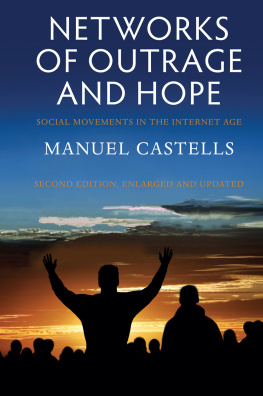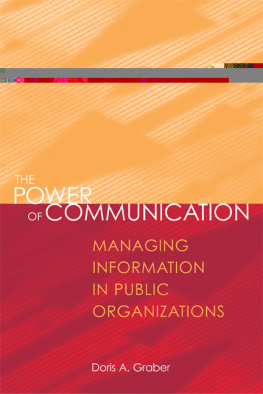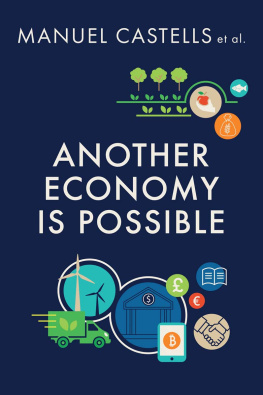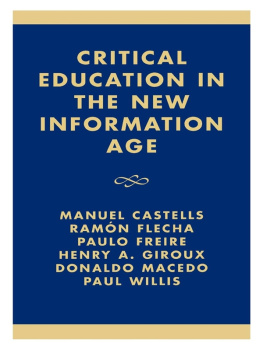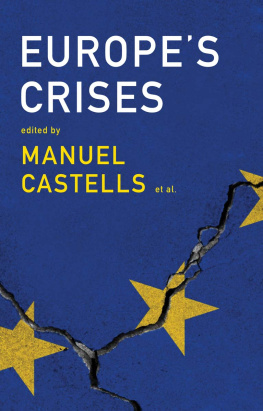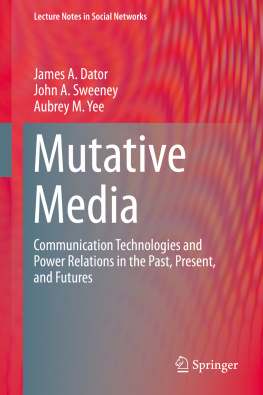Castells - Communication Power
Here you can read online Castells - Communication Power full text of the book (entire story) in english for free. Download pdf and epub, get meaning, cover and reviews about this ebook. City: Oxford, year: 2013;2009, publisher: Oxford University Press, genre: Politics. Description of the work, (preface) as well as reviews are available. Best literature library LitArk.com created for fans of good reading and offers a wide selection of genres:
Romance novel
Science fiction
Adventure
Detective
Science
History
Home and family
Prose
Art
Politics
Computer
Non-fiction
Religion
Business
Children
Humor
Choose a favorite category and find really read worthwhile books. Enjoy immersion in the world of imagination, feel the emotions of the characters or learn something new for yourself, make an fascinating discovery.

Communication Power: summary, description and annotation
We offer to read an annotation, description, summary or preface (depends on what the author of the book "Communication Power" wrote himself). If you haven't found the necessary information about the book — write in the comments, we will try to find it.
Castells: author's other books
Who wrote Communication Power? Find out the surname, the name of the author of the book and a list of all author's works by series.
Communication Power — read online for free the complete book (whole text) full work
Below is the text of the book, divided by pages. System saving the place of the last page read, allows you to conveniently read the book "Communication Power" online for free, without having to search again every time where you left off. Put a bookmark, and you can go to the page where you finished reading at any time.
Font size:
Interval:
Bookmark:
COMMUNICATION POWER
MANUEL CASTELLS


Great Clarendon Street, Oxford OX2 6DP
Oxford University Press is a department of the University of Oxford.
It furthers the Universitys objective of excellence in research, scholarship,
and education by publishing worldwide in
Oxford New York
Auckland Cape Town Dar es Salaam Hong Kong Karachi
Kuala Lumpur Madrid Melbourne Mexico City Nairobi
New Delhi Shanghai Taipei Toronto
With offices in
Argentina Austria Brazil Chile Czech Republic France Greece
Guatemala Hungary Italy Japan Poland Portugal Singapore
South Korea Switzerland Thailand Turkey Ukraine Vietnam
Oxford is a registered trade mark of Oxford University Press
in the UK and in certain other countries
Published in the United States
by Oxford University Press Inc., New York
Manuel Castells 2009
The moral rights of the author have been asserted
Database right Oxford University Press (maker)
First published 2009
All rights reserved. No part of this publication may be reproduced,
stored in a retrieval system, or transmitted, in any form or by any means,
without the prior permission in writing of Oxford University Press,
or as expressly permitted by law, or under terms agreed with the appropriate
reprographics rights organization. Enquiries concerning reproduction
outside the scope of the above should be sent to the Rights Department,
Oxford University Press, at the address above
You must not circulate this book in any other binding or cover
and you must impose the same condition on any acquirer
British Library Cataloguing in Publication Data
Data available
Library of Congress Cataloging in Publication Data
Data available
Typeset by SPI Publisher Services, Pondicherry, India
Printed in Great Britain
on acid-free paper by
Clays Ltd., St Ives Plc
ISBN 9780199567041
1 3 5 7 9 10 8 6 4 2
To the memory of Nicos Poulantzas,
my brother,
theorist of power
Books are usually a collective endeavor under the authors sole responsibility. This one is no exception. It was born in my mind a long time ago, but it has evolved in interaction with colleagues and students from around the world, and has been shaped by the academic and social environments in which I have lived and worked since the beginning of this millennium. And so, to name the people and institutions who are the co-producers of this work is not a matter of courtesy, but of accuracy in signing the book.
My first acknowledgment goes to Amelia Arsenault, my doctoral student, an outstanding research assistant, and the Wallis Annenberg Graduate Research Fellow at the Annenberg School for Communication, University of Southern California. Simply put, without the intellectual quality and personal dedication of her work over the years, this book would not exist in its current form. She will go on in her academic career to become a great scholar with wonderful values as she engages in understanding the world to make it a better place.
Additional support for the research on which this book is based came from the excellent research assistance of Lauren Movius, Sasha Costanza-Chock, and Sharon Fain, graduate students at the Annenberg School for Communication, and from Dr. Meritxell Roca, my collaborator at the Internet Interdisciplinary Institute of the Universitat Oberta de Catalunya in Barcelona. Earlier versions of the analyses presented in this volume have been discussed and modified through interaction with my students at the Annenberg School for Communication. I wish to convey special thanks to the students of my research seminar Comm620: Communication, Technology, and Power in the spring of 2008. Specific acknowledgment of the work of several students in this and other seminars can be found in the books notes and references.
My current research, in this book and in other works, has benefited considerably from the intellectual stimulation of my two academic homes: the Annenberg School for Communication at the University of Southern California (USC) in Los Angeles, and the Internet Interdisciplinary Institute of the Universitat Oberta de Catalunya (UOC) in Barcelona. I feel deeply indebted to my colleagues in both institutions for the support and collegiality they have provided over the years. I particularly thank Dean Geoffrey Cowan, Dean Ernest Wilson, Director Larry Gross, and Director Patricia Riley at USC, and Rector Imma Tubella at UOC, for the wonderful personal and institutional support they have given my research since joining the Annenberg School for Communication at USC and the Internet Interdisciplinary Institute at UOC. These academic institutions are at the cutting edge of research and teaching on the global network society, and I feel proud to share their meaningful project of situating the university within the technological and intellectual conditions of the Information Age.
I am also grateful to my colleagues and students at the Massachusetts Institute of Technology (MIT Science, Technology, and Society Program; Department of Urban Studies and Planning; and Media Lab) for their meaningful interaction during my regular teaching periods as a visiting professor in one of the leading scientific institutions of the world. My special thanks go to William Mitchell, Rosalind Williams, David Mindell, Larry Vale, and Malo Hutson.
When I say that this book is a collective work, I mean it. It has received the most generous intellectual contribution from a number of colleagues who have read all or parts of various drafts of the manuscript, and commented extensively on it. I have gone through several rounds of revisions for each chapter, since each time I thought I had reached the point at which my research could be communicated, new comments and suggestions would come from colleagues willing to engage in a dialogue with me during the process of elaborating this book. I have modified my argument, updated my data, and tightened my writing as a result of these multiple interactions with colleagues from different academic institutions. I have not been able to integrate every comment, as many of them came from different perspectives, but I have seriously considered every single comment I received, and this has led to substantial changes in the theory and analyses presented in the book. Of course, misunderstandings and mistakes during this lengthy revision process are my exclusive responsibility. And so, I want to publicly express my deepest gratitude to Antonio Damasio, Hanna Damasio, Jerry Feldman, George Lakoff, Jonathan Aronson, Tom Hollihan, Peter Monge, Sarah Banet-Weiser, Ernest Wilson, Jeffrey Cole, Jonathan Taplin, Marty Kaplan, Elizabeth Garrett, Robert Entman, Lance Bennett, Frank Webster, Robin Mansell, William Dutton, Rosalind Williams, Imma Tubella, Michael Dear, Ingrid Volkmer, Geoffrey Bowker, John Thompson, Ronald Rice, James Katz, W. Russell Neuman, George Marcus, Giancarlo Bosetti, Svetlana Balmaeva, Eric Klinenberg, Emma Kiselyova, Howard Tumber, Yuezhi Zhao, Ren Weber, Jeffrey Juris, Jack Linchuan Qiu, Irene Castells, Robert McChesney, and Henry Jenkins. Their collegiality demonstrates that open-source co-production is actually a medieval invention that began in the university environment, and continues today as an essential practice in scientific inquiry.
I am also grateful to the colleagues, students, and citizens at large who commented on my public presentations of the ideas and analyses on communication and power that ultimately led to the elaboration of this book. This interaction at different venues between 2003 and 2008 considerably sharpened the tentative argument I had in my mind years ago when I first engaged in this research project. In particular, I would like to acknowledge the Board of the International Communication Association (ICA), with special thanks to Ingrid Volkmer and Ronald Rice, and the attendees of my lecture at the 2006 meeting of the ICA in Dresden; the American Political Science Association, and the attendees of my 2004 Ithiel de Sola Pool Lecture in Chicago; the London School of Economics and Political Science; the Program in Science, Technology, and Society at MIT; the Milano Graduate School of Management at the New School University in New York; the De Balie Cultural Center in Amsterdam; the Spanish Academy of Cinema and Television in Madrid; the Catalan Parliament in Barcelona; the Institute Fernando Henrique Cardoso in So Paulo; the World Political Forum in Venice; the Gulbenkian Foundation in Lisbon; the School of Information Science at the University of California, Berkeley; my colleagues at the Center for Science, Technology, and Society at Santa Clara University; and my fellows at the Los Angeles Institute of the Humanities.
Next pageFont size:
Interval:
Bookmark:
Similar books «Communication Power»
Look at similar books to Communication Power. We have selected literature similar in name and meaning in the hope of providing readers with more options to find new, interesting, not yet read works.
Discussion, reviews of the book Communication Power and just readers' own opinions. Leave your comments, write what you think about the work, its meaning or the main characters. Specify what exactly you liked and what you didn't like, and why you think so.

